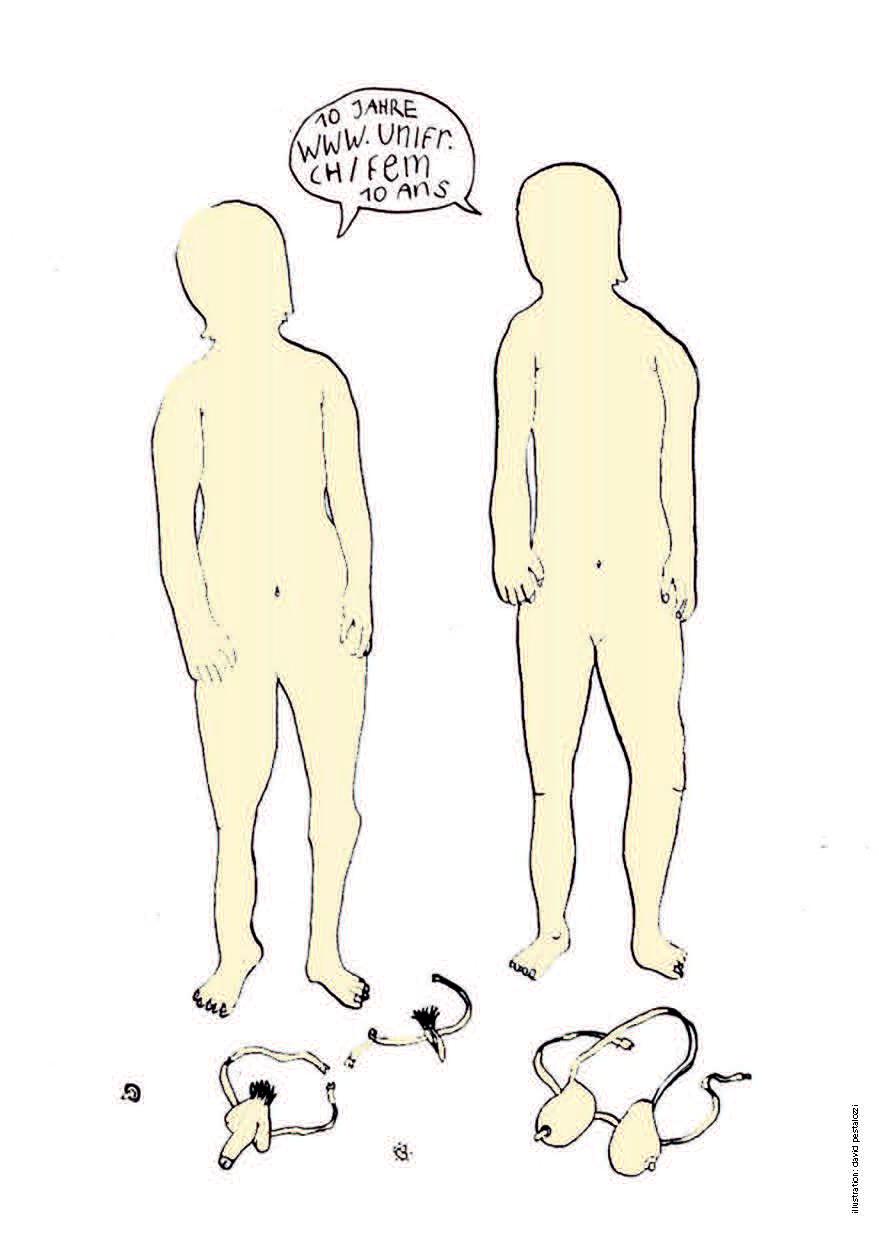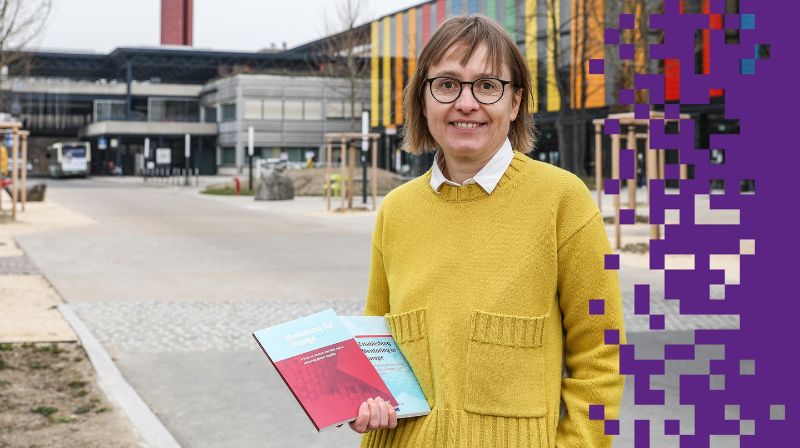Two decades of promoting women's issues
“As a teenager I was drawn to the cause of feminist movements, but I didn’t join an activist group. Back then the challenges I faced were due less to my gender than to my family’s modest background,” says Fueger. “In high school I suffered from imposter syndrome – I often felt out of place. So the feminist discourse resonated with me. It seemed to validate my right to pursue the career I wanted. It was very liberating.”
This validation is what propelled Fueger to advance freely through her school years. She obtained a high-school diploma in science in St. Gallen, picking up a slight Swiss-German accent along the way, before going on to study political science at the University of Lausanne. In 1996, in response to increasing political pressure, Swiss universities began adopting policies to promote gender equality. That’s when the University of Fribourg hired Fueger, straight out of her studies, as its Women’s Issues Officer.

Helène Fueger, bottom left, at the Cantonal Gymnasium of Saint Gall, in 1988
A small desk with an outsized in tray
“It was a new position the University had created to address what was then a new problem,” she says. “Sometimes I had the impression that the University would’ve liked to just lock the problem in my office and throw away the key – a feeling underscored by the fact that my office was located almost in the basement! But I had a ton of things to accomplish in my new role. My to-do list was huge, and it spanned the entire organization. It was just a half-time job, however, for budgetary reasons. But I was young – I told myself that I’m not being paid to complain, but to work.”
Fueger therefore began her “years of experience,” as she calls them, dealing with the intricacies of a large organization. She realized that change was slow, yet she managed to take incremental steps forward thanks to her determination and placid demeanor. “I don’t think I was motivated by a grand vision, but rather by an insatiable curiosity. I found the job really interesting because I had a unique position within the school – I could see how the organization as a whole worked and spot places where progress was needed.”

Postcard created by a class of graphic designers for the 10th anniversary of the UNIFR Equality Office
EU mentoring program
Fueger’s job evolved over the years; she eventually got a small staff and was able to implement some of her ideas. While she may be small in stature, she accomplished mammoth tasks. These ranged from opening up daycare facilities at the University to laying the foundation for a new gender studies program. Two of her initiatives – the Women in Science and Technology (WINS) program and a mentoring program she set up in 2000, with the support of EPFL – are still active today. Fueger was also involved in hiring faculty at two university departments.
In 2006, Fueger became the first person from the University of Fribourg appointed to coordinate an EU program. “We set up a network of European universities to provide mentoring opportunities for young women and published two books on the issue.”
She left the University of Fribourg in 2015, after 18 busy years and with the satisfaction of seeing the faculty comprised of 24% female professors – up from less than 4% when she was hired.

© 2021 EPFL Alain Herzog / Hélène Fueger contributes to the writing of two books on mentoring
“I was contacted about the EPFL position by Farnaz Moser, who was then the head of EPFL’s equal opportunity office,” says Fueger. “We had worked together on various regional initiatives, and I had helped bring EPFL’s Internet for Girls program to Fribourg.”
When Fueger started at EPFL she was happy to see that she wouldn’t have to “fight the fight alone.” She worked under Kristin Becker van Slooten, who had set up the gender equality steering committee, and had the support of an assistant, Chantal Mellier.
In addition to the pleasure of being part of a team, Fueger also enjoyed the energy and enthusiasm of the people she worked with. “Maybe that was because several of them had been through the US system,” she says. “In any case, I met many highly motivated professors, both men and women. I quickly got to know all the deans, including Gisou van der Goot and Marilyne Andersen. I felt people were genuinely interested in the issue and wanted to move things forward. It was impressive.”
That enthusiasm hasn’t diminished over the years – on the contrary. Since 2015, Fueger has been working to develop and implement an EPFL-wide gender equality policy for the hiring of women professors, along with seminars on equality in hiring that include video testimonials of implicit biases. “Nearly 40% of EPFL professors have taken the seminar. That’s an impressive figure, especially since the seminars are optional except for the heads of hiring committees,” she says.
As part of commemorations for EPFL’s 50th anniversary, portraits of 50 prominent women scientists and engineers were put up in buildings around campus. Now those portraits are displayed at the Lausanne History Museum. “I’m quite proud to have contributed to this kind of initiative,” says Fueger, with her characteristic modesty.

© 2019 EPFL Alain Herzog

© 2019 EPFL Alain Herzog
